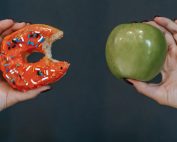Day 16: An explanation that makes sense – Part 6a
Can the human race fix its own problems?
Bible References (NIV)
9 Fools mock at making amends for sin, but goodwill is found among the upright.
10 Each heart knows its own bitterness, and no one else can share its joy.
11 The house of the wicked will be destroyed, but the tent of the upright will flourish.
12 There is a way that appears to be right, but in the end it leads to death.
22 Although they claimed to be wise, they became fools
23 and exchanged the glory of the immortal God for images made to look like a mortal human being and birds and animals and reptiles.
24 Therefore God gave them over in the sinful desires of their hearts to sexual impurity for the degrading of their bodies with one another.
25 They exchanged the truth about God for a lie, and worshiped and served created things rather than the Creator—who is forever praised. Amen.
26 Because of this, God gave them over to shameful lusts. Even their women exchanged natural sexual relations for unnatural ones.
27 In the same way the men also abandoned natural relations with women and were inflamed with lust for one another. Men committed shameful acts with other men, and received in themselves the due penalty for their error.
28 Furthermore, just as they did not think it worthwhile to retain the knowledge of God, so God gave them over to a depraved mind, so that they do what ought not to be done.
29 They have become filled with every kind of wickedness, evil, greed and depravity. They are full of envy, murder, strife, deceit and malice. They are gossips,
30 slanderers, God-haters, insolent, arrogant and boastful; they invent ways of doing evil; they disobey their parents;
31 they have no understanding, no fidelity, no love, no mercy.
32 Although they know God’s righteous decree that those who do such things deserve death, they not only continue to do these very things but also approve of those who practice them.
Devotional
Have you ever incorrectly diagnosed a problem, resulting in a solution that made things worse? Correctly diagnosing a problem is essential to fixing it! What then is the problem on planet Earth?
The Christian view is that the core problem on planet Earth is in our human nature. We have been corrupted by sin! In practice, this belief leads to an admission of our sin, taking personal responsibility for moral improvement, and seeking God’s help in this. Like a hand that fits a glove, the best outcomes in history have followed this simple view of life.
The contrasting view is that if there is no God, the key problem on Earth lies in the institutions and systems we’ve created that shape people’s thinking. This suggests that humans are like animals who can be trained, and the real problem is therefore outside of us, not inside us. The French philosopher Jean-Jacques Rousseau was a pioneer in this ‘modern’ way of thinking. He suggested human nature was essentially good rather than bad and that it was the thinking imparted through our educational institutions and religions that corrupted people. However, when later applied, this belief led to devastation and death, as today’s video clip will show. Why?
What if good outcomes are the result of true things? What if this is the case because there is a moral and psychological design to life, as should be expected if there is a God?
Imagine a sports car built for a flat sealed race track that is then placed on an off-road track made of mud and sand. The car might not even be able to move! In the same way, if there is a God and we reject the values that he created us to live by, we should expect things will fall apart. So, what does history say?
Today you read from the book of Proverbs. The writer describes his observation of those who deny God. They mocked the idea of sin. He explains how the thinking and behaviour that followed led to their destruction. (It didn’t make their lives better.)
You also just read from the book of Romans. Paul describes the natural pride within us that drives us to want to live without God. He then explains the troubles that he observed to come from this. He first explains the moral breakdown affecting relationships and family. From this comes a wider breakdown in society, including “human wickedness, evil, greed and depravity.” I suggest what Paul says next is simply a list of behaviours observed in their Greco-Roman leaders whose behaviour caused immense suffering. To quote, “They are full of envy, murder, strife, deceit and malice… …they have no understanding, no fidelity, no love, no mercy…” I suggest Paul is describing the societal breakdown that a rejection of the idea of God naturally leads to.
It is maybe as Lord Acton (and Spiderman) put it; ‘Power corrupts and absolute power corrupts absolutely.’ The problem on our planet isn’t in our institutions – it’s in our hearts. History says a lot in support of this view. The explanation of life given in the Bible both makes sense and works in practice – and it’s another reason Christians believe Christianity to be true.
Video clip: An explanation that makes sense – Part 6a — 8mins
Reflection questions
- Where did the idea that humans are naturally good come from in ‘recent’ history (the past couple of hundred years)?
- What has the idea that humans are good and can fix their problems without God led to in history? Why?
- Based on what you know of history, would it be logical to assume that we really can save ourselves and our planet from evil and pain without regard for God? Why or why not?
For prayer
“Lord Jesus, we apologise for the way we have made a mess of this planet. We apologise for the times we have rejected even the very idea of your existence, seeking to rule the world by our own might. We have created misery beyond measure. Thank you that you still look upon us with grace, willing to forgive and also to help.”
related topics
coming up in our next devotion
Day 17: An explanation that makes sense – Part 6b
This is the idea that there is a God. If so, a fixed moral law therefore exists, because there is a moral law giver (God). He created this good law for our good, with a full view of all of our history before him. His laws are not random. There is therefore a basis for defining good — and also a basis for valuing all human life.



